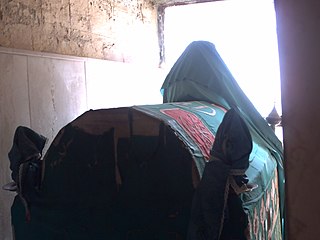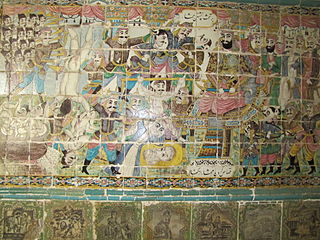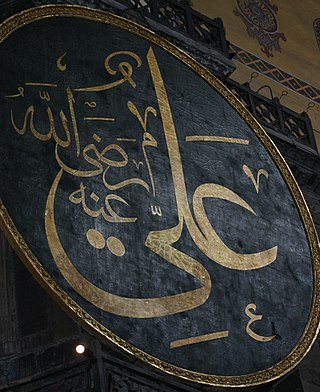
Husayn ibn Ali ibn Abi Talib was a prominent early Islamic figure. He was a grandson of the Islamic prophet Muhammad and a son of Ali ibn Abi Talib and Muhammad's daughter Fatima, as well as a younger brother of Hasan ibn Ali. He is regarded as the third Imam in Shia Islam after his brother, Hasan, and before his son, Ali ibn Husayn Zayn al-Abidin. Being a grandson of the prophet, he is a member of the Ahl al-Bayt. He is also considered to be a member of the Ahl al-Kisa, and a participant in the event of Mubahala. Muhammad described him and his brother, Hasan, as the leaders of the youth of Paradise.

The Battle of Karbala was fought on 10 October 680 between the army of the second Umayyad caliph Yazid I and a small army led by Husayn ibn Ali, the grandson of the Islamic prophet Muhammad, at Karbala, Sawad.

Al-Abbas ibn Ali ibn Abi Talib, also known as Abu al-Fadl, was a son of Ali ibn Abi Talib, the fourth caliph in Sunni Islam and the first imam in Shia Islam. His mother was Fatima bint Hizam, commonly known as Umm al-Banin. Abbas fought as the standard-bearer of his half-brother Husayn ibn Ali in the Battle of Karbala on 10 Muharram 61 AH against the army of the Umayyad caliph Yazid ibn Mu'awiya. He was killed in a desperate attempt to bring water from the Euphrates river to quench the unbearable thirst of the besieged family of the Islamic prophet Muhammad. Abbas is said to have inherited Ali's boldness and bravery, and was praised by Shia imams for his faith and fortitude in defending Husayn. Abbas is regarded by Shia Muslims as an ultimate paragon of courage and self-sacrifice. The shrine of Abbas and the nearby mausoleum of Husayn in Karbala are destinations for pilgrimage.

Muhammad ibn Abi Bakr ibn Abi Quhafa al-Taymi was an Arab Muslim commander in the service of the fourth Rashidun caliph Ali.
Zaynab bint Ali, was the eldest daughter of Fatima and Ali ibn Abi Talib. The former was a daughter of the Islamic prophet Muhammad, and the latter was his cousin. Ali is also recognized as the fourth Rashidun caliph and the first Shia imam. Zaynab is best known for her role in the aftermath of the Battle of Karbala, in which her brother Husayn and most of her male relatives were massacred by the forces of the Umayyad caliph Yazid ibn Mua'awiya. Women and children in Husayn's camp were taken captive after the battle and marched to Kufa and then the Umayyad capital Damascus, where Zaynab gave impassioned speeches, condemning Yazid and spreading the news of Karbala. She was later freed and died shortly afterward in 682, but her burial site is uncertain. The two shrines associated with Zaynab in Damascus and Cairo are destinations for Muslim pilgrimage. She is considered to be a symbol of sacrifice, strength, and piety in Islam, and a role model for Muslim women, typifying courage, leadership, and defiance against oppression.
Muslim ibn Aqil al-Hashimi was a relative of the Islamic prophet Muhammad. Muslim was the son of Aqil ibn Abi Talib and a cousin of Husayn ibn Ali, the third Shia Imam, who dispatched him to Kufa in Iraq to ascertain their support upon the accession of the Umayyad caliph Yazid. The Kufans welcomed Muslim and overwhelmingly pledged to support Husayn against the Umayyad rule, which they considered illegitimate and tyrannical. In response, Yazid replaced the mild governor of the city with his strongman Ubayd-Allah ibn Ziyad, who soon discovered the hideout of Muslim through an informant. When Ibn Ziyad imprisoned or killed Hani ibn Urwa, who was secretly sheltering Muslim, he came out in open revolt and surrounded the governor's palace with his supporters in September 680 CE. With a combination of threats and promises, however, Ibn Ziyad induced Kufan tribal leaders to abandon Muslim and withdraw their men. A deserted Muslim was arrested after a strong resistance and executed. Before this turn of events, he had written to Husayn and urged him to come to Kufa. Husayn thus left Mecca with his family and a few supporters, but his caravan was intercepted and massacred by the Umayyad forces in October 680 in Karbala, near Kufa. Muslim is revered in Shia Islam for his bravery and moral uprightness. His shrine in Kufa is a destination for Shia pilgrims.

Abd Allah ibn Ja'far ibn Abi Talib al-Hashimi was a companion and relative of the Islamic prophet Muhammad, a nephew of Ali, a half-brother of Muhammad ibn Abi Bakr and grandfather of Abd Allah ibn Mu'awiya.
Ali al-Akbar ibn al-Husayn, commonly known as simply Ali al-Akbar, was the son of Layla bint Abi Murra and Husayn ibn Ali, the third Shia imam and the grandson of the Islamic prophet Muhammad. Aged between eighteen and twenty-five, Ali was killed at the Battle of Karbala in 680 CE, alongside his father and some seventy-two relatives and supporters, who fought against the army of the Umayyad caliph Yazid ibn Mu'awiya. In Shia Islam, Ali al-Akbar is commemorated as a brave youth martyred before he could marry, and celebrated for his striking resemblance, in appearance and manners, to his great-grandfather, the Islamic prophet Muhammad.

Al-Mukhtar ibn Abi Ubayd al-Thaqafi was a pro-Alid revolutionary based in Kufa, who led a rebellion against the Umayyad Caliphate in 685 and ruled over most of Iraq for eighteen months during the Second Fitna.

Muhammad ibn al-Hanafiyya was a son of Ali ibn Abi Talib, who was the fourth caliph in Sunni Islam and the first imam in Shia Islam. Ibn al-Hanafiyya was an effective lieutenant for his father Ali during his caliphate. After the assassination of Ali and the deaths of his two sons Hasan and Husayn, many recognized Ibn al-Hanafiyya as the head of the House of Ali. Claiming to represent Ibn al-Hanafiyya, Mukhtar al-Thaqafi rose in Iraq in 686 to avenge Husayn and his relatives, who were massacred in 680 CE by forces of the Umayyad caliph Yazid bin Mu'awiya. The quiescent Ibn al-Hanafiyya did not actively associate with this rebellion but was still rescued by Mukhtar when he was detained by the rival caliph Ubayd Allah ibn Ziyad. Support for Ibn al-Hanafiyya continued even after the defeat and death of Mukhtar in 686–687 in the form of the Kaysanites, a now-extinct Shia sect that traced the imamate to Ibn al-Hanafiyya and his descendants, particularly his son Abu Hashim. After the death of Ibn al-Hanafiyya in 700–701, some Kaysanites declared that he was the Mahdi, the eschatological Islamic leader who would reappear in the end of time and eradicate injustice and evil. The Kaysanites later provided the organizational structure for the Abbasids to overthrew the Umayyads in 750–751.

Jaʿfar ibn Abī Ṭālib, also known as Jaʿfar aṭ-Ṭayyār, was a companion and cousin of the Islamic prophet Muhammad, and an elder brother of Ali.
Muḥammad ibn Muslim and Ibrāhīm ibn Muslim were the sons of Muslim ibn Aqil and the grandsons of Aqil ibn Abi Talib. Muslim ibn Aqil was the messenger of Husayn ibn Ali to the people of Kufa, while Aqil ibn Abi Talib was the brother of Ali and the cousin of Muhammad. These children are also included among the martyrs of the Battle of Karbala.
Abu Talib ibn Abd al-Muttalib was the leader of Banu Hashim, a clan of the Qurayshi tribe of Mecca in the Hejazi region of the Arabian Peninsula. He being the brother of Abdullah, the father of the Islamic Prophet Muhammad, was his uncle and father of Ali. After the death of his father Abd al-Muttalib ibn Hashim ibn Abd Manaf, he inherited this position as tribal chieftain, and the offices of Siqaya and Rifada. He was well-respected in Mecca.

Al-Hurr ibn Yazid ibn Najiyah Al-Tamimi Al-Yarbuʿi Ar-Riyahi was the general of the Umayyad army dispatched from Kufa, Iraq to intercept al-Husayn ibn Ali ibn Abu Talib. The newly appointed governor of Kufa, Ubayd Allah ibn Ziyad, issued the command to guard all entrances and exits to Kufa in order to intercept al-Husayn for an oath of allegiance to Yazid ibn Mu'awiya ibn Abu Sufyan of the Umayyad dynasty. Al-Hurr ibn Yazid al-Tamimi al-Yarbu'i was to guard one of the roads with his 1,000 soldiers to sanction al-Husayn and his followers and bring them to Ibn Ziyad. Initially responsible for holding al-Husayn and his followers captive, al-Hurr died fighting on al-Husayn's behalf after decisions fueled by corrupt intentions surfaced from Ubayd Allah ibn Ziyad. Al-Hurr's short but provocative mark on history spans less than one week's time, but is embedded with complex details and fatal turns of events that led to the martyrdom of al-Husayn during the Battle of Karbala.
Abū al-Sābigha Shamir ibn Dhī al-Jawshan, often known as Shamir or Shimar, was an Arab military commander from Kufa who killed Husayn ibn Ali, the grandson of the Islamic prophet Muhammad, at the Battle of Karbala in 680.
Abū Ḥajal Muslim ibn ʿAwsaja al-Asadī was a companion of the Islamic prophet Muhammad. He assisted Muslim ibn Aqil in Kufa. Then he joined Husayn ibn Ali army with his family. He was killed in battle of Karbala.

Bab al-Saghir Cemetery is an Islamic cemetery in Damascus, Syria. It is about 200 meters to the southwest of the Bab al-Saghir gate.
Sa'id ibn 'Abd Allah al-Hanafi was a companion of Husayn ibn Ali who was martyred in the Battle of Karbala. As a prominent Shi'ite and a nobleman in Kufa, he played a significant role in calling Imam al-Husayn to Kufa. He delivered several important letters of the Kufans to Imam al-Husayn. The final letter he delivered was Muslim ibn Aqil's letter to the Imam. From that point he accompanied the Imam from Mecca to Karbala. Sa'id is also remembered for his speech on the night before Ashura in which he proved his love for the Ahl al-Bayt and support of Imam al-Husayn.
Abd al-Rahman ibn Abd Allah al-Arhabi was martyred in Karbala.










